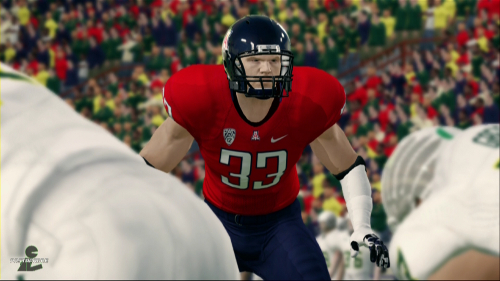Six Current College Football Players Added as Plaintiffs to Likeness Lawsuit

With the judge requiring current athletes get involved now in order to consider them as a party should the player likeness lawsuit be certified as class action attorneys today revealed the names of those that will now be added to the case bringing the total number of plaintiffs to 22 – 16 former athletes and 6 current ones.
Darius Robinson, CB (Clemson)
Chase Garnham, LB (Vanderbilt)
Victor Keise, WR (Minnesota)
Moses Alipate, TE (Minnesota)
Jake Fischer, LB (Arizona)
Jake Smith, K (Arizona)
Robinson, Garnham, and Fischer are all fairly significant contributors to their teams. Alipate hasn’t played a down in four years of eligibility, Keise had one reception in 2010, and another is a kicker. As far as NCAA Football 14’s rosters go it appears Alipate and Keise were not represented at all by a character with their number.
Their experience and level of play however is really inconsequential to whether their likenesses were or were not improperly used. The decision on whether the case will be certified as class action could come within the next few weeks.
Earlier/Summary Below
The player likeness lawsuit against the NCAA, CLC, and Electronic Arts is the culmination of two high profile filings that were combined as led by Sam Keller and Ed O’Bannon (and O’Bannon now heads it up). It alleges improper use of player likeness through various forms of merchandise and media including video games in which the parties in question conspired to avoid paying players for their rights. Some interesting details and claims regarding the case at hand were revealed when EA was reentered as a defendant after initially being dismissed.
EA originally won a previous case regarding player likeness with the courts ruling video games are artistic works rather than commercial speech and therefore protected by the First Amendment. The Supreme Court in 2011 established forms of media, producing expressive works of art, are not subject to judgments based on incorporating someone’s name or likeness. That dismissed case however, involving Ryan Hart, has resurfaced after an appeals court reversed a decision based on that argument.
Recent uncovered emails have shown that NCAA representatives were well aware that players in games were based off real-life players. At one point the NCAA and EA had nearly reached an agreement to have actual player names included in the products. The EA Locker / Roster Share feature was a fallback option. With momentum clearly on the plantiffs’ side NCAA reps have begun to publicly express concern over the future of collegiate sports. A former EA Sports producer admitted players in NCAA games were based off real athletes.
The discovery of Tim Tebow’s name being in NCAA Football 10 could throw another wrench into EA’s series of arguments. Depositions from former Alabama wide receiver Tyrone Prothro and UConn basketball guard Tate George support the defendant’s reasoning for denying class action certification. The class action hearing resulted in the judge heavily questioning the legitimacy of a potential class and insisting a current athlete be involved. The judge required current athletes be added as plaintiffs for that party to have representation if the case is certified as class action.
This consolidated case in California if certified as class action would go to trial – barring a settlement – and ultimately be the determining factor of how the NCAA proceeds in the future handling broadcasting rights, merchandising, and video games. Should a negative result come down, which one analyst has pegged as being a potential loss of $1 billion for EA, it would likely not just end the NCAA Football series but also with it any realistic possibility of college sports games being made in the future. The trial now is slated to begin June 2014. Appeals following a decision could extend the fight through 2020.
